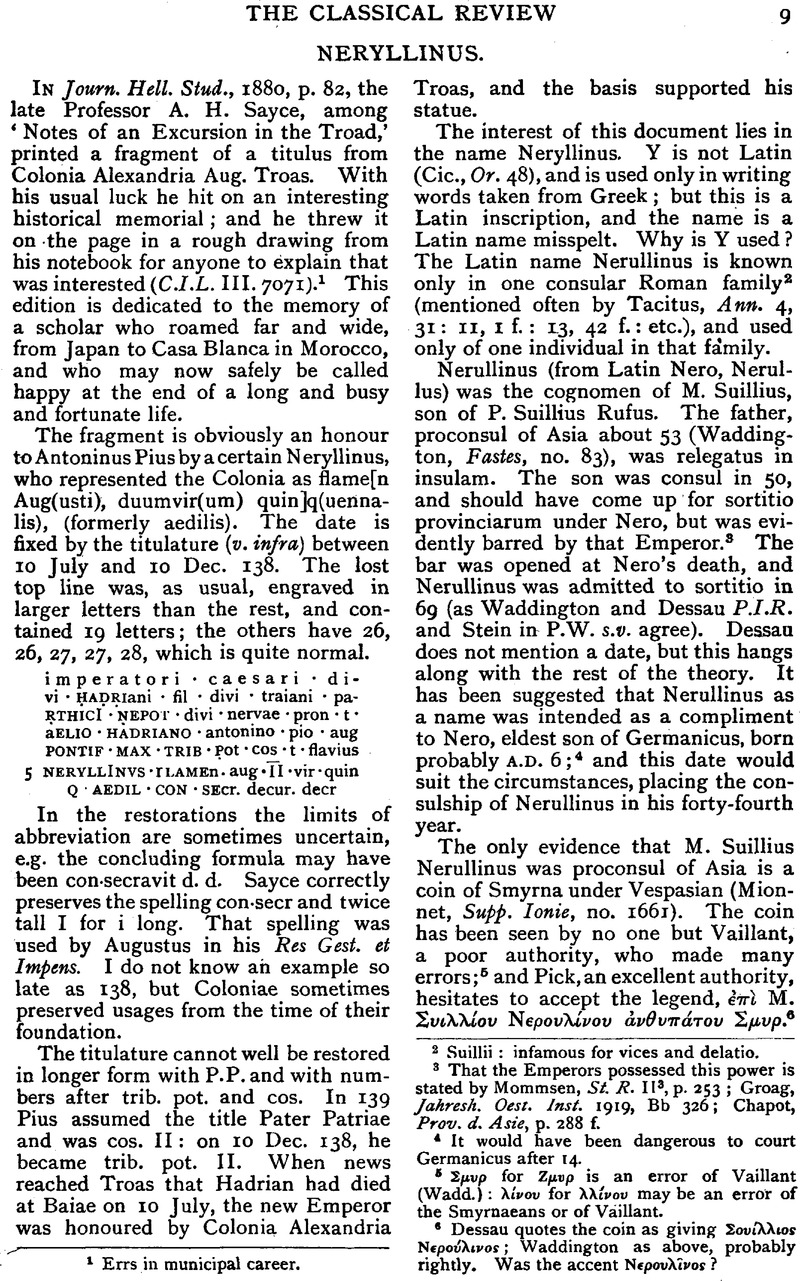No CrossRef data available.
Article contents
Abstract

- Type
- Review Article
- Information
- Copyright
- Copyright © The Classical Association 1934
References
page 9 note 1 Errs in municipal career.
page 9 note 2 Suillii: infamous for vices and delatio.
page 9 note 3 That the Emperors possessed this power is stated by Mommsen, , St. R. II 3, p. 253Google Scholar; Groag, , Jahresh. Oest. Inst. 1919, Bb 326Google Scholar; Chapot, , Prov. d. Asie, p. 288 f.Google Scholar
page 9 note 4 It would have been dangerous to court Germanicus after 14.
page 9 note 5 Σμυρ for Ζμυρ is an error of Vaillant (Wadd.): λνου for λλνου may be an error of the Smyrnaeans or of Vaillant.
page 9 note 6 Dessau quotes the coin as giving Σουλλιος Νερολινος; Waddington as above, probably rightly. Νερουλῖνος?
page 10 note 1 The enfranchised civis is analogous to a libertus of the Emperor, and the Emperor is his patronus, in a sense.
page 10 note 2 The coloniae came to speak Greek in the East, but officially they long retained the use of Latin in inscriptions and coinage.
page 10 note 3 A suggestive paper on Latin spelling before Y was invented, when Burrus meant Pyrrhus, was published by J. P. Postgate in Proc. of the Brit. Academy.
page 11 note 1 If he had been of the Colonia, he would have been of Sergia tribus. Robinson and I saw it on the way to Antiochea, from which it is fully 57 MP distant.
page 11 note 2 Between Magnesia Sip., Aigai Aeol., and Apollonis Lyd.: dated in second century by Keil and Premerstein, Reise I, no. 91. Cives often are silent about their non-Roman father (Roman custom).
page 12 note 1 Calder does not indicate the lacuna before Γιος in his transcription, only in his photograph.
page 12 note 2 Snow and rain gather and freeze in the surface.
page 12 note 3 Calder says ‘at the conclusion of a voyage’: if voyage is taken in the French sense, that is right, if in the English sense, it is not.
page 12 note 4 Longinus veteran praetorian in Sterrett, W.E. no. 19 at Derbe Lycaon. Yet his third son was in an (auxiliary) ala II Gall(orum). L. Calpurnius Longus (above) similarly was auxiliary; there were no legions in Gaiatia; but his father was civis, taking name from L. Calpurnius Frugi, an earlier legatus Galatiae.
page 12 note 5 Calder has an excellent example in J.R.S. 1924, p. 74 £; but takes it as grave of the soldier himself: it is the son's grave.
page 13 note 1 Bohn, Heimat der praetoriani, to which I have not access.


